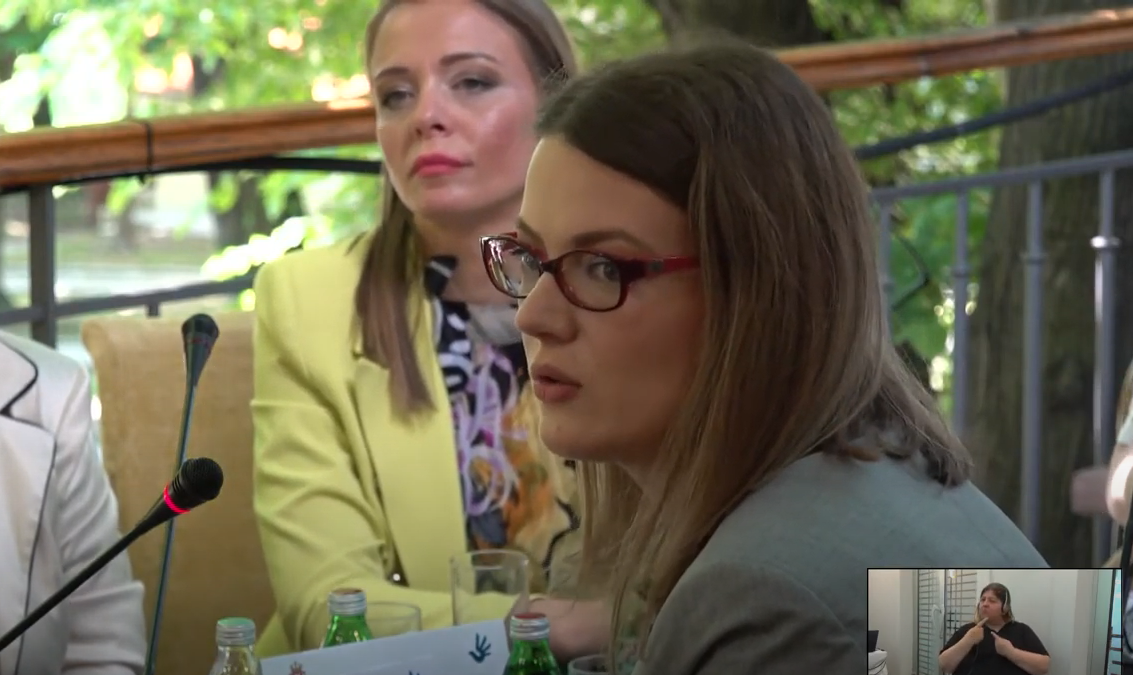Hotline: +381 61 63 84 071
The first Thematic Social Dialogue

Organization Atina at the Thematic Social Dialogue on the Social Protection System in the Republic of Serbia 2021
Photo: YouTube screenshot
The first of two meetings within the Thematic Social Dialogue on the Social Protection System in the Republic of Serbia, which were initiated and proposed by civil society organizations, was held on June 10, 2021. Andrijana Radoičić Nedeljković, coordinator of the program for direct support to victims of human trafficking, spoke on behalf of organization Atina, which has been active in the area of protection of victims of human trafficking for 18 years, but also on behalf of women and children victims of gender-based violence and exploitation that Atina is supporting. She pointed out some of the challenges that the system of protection of victims of human trafficking has been facing since its institutionalization, that is, since the Government of the Republic of Serbia entrusted the mandate of victim identification and coordination to the Ministry of Labor, Employment, Social and Veterans Affairs.
"In the first place, when it comes to the area of social protection, there is a lack of equalization and full recognition of all beneficiaries from sensitive and particularly vulnerable categories in all strategic, operational and legislative solutions. By these, we primarily mean: victims of human trafficking, women and children victims of violence, children victims of various forms of exploitation, migrants (asylum seekers), unaccompanied children, women and girls in prostitution," colleague Radoičić Nedeljković said and added that “In practice, victims of trafficking have been recognized within other beneficiary groups for years now, but never as a separate entity, in order to adequately be provided with assistance and support, and as one of the basic rights of the victims of trafficking is to be identified, their classification into other beneficiary groups actually deprives them of visibility. Therefore, it is necessary to recognize and count all vulnerable beneficiary groups, i.e. to unify the recognition of social protection beneficiaries, both in the strategic, operational and legislative framework, and provide them with access to social protection rights."
Andrijana Radoičić Nedeljković from Atina also emphasized how important it is for the Ministry of Labor, Employment, Social and Veterans Affairs to take over and clearly define competencies, mandate and responsibility when it comes to identification and coordination of the victims’ protection. Especially when it comes to minor victims, as there is an unclear demarcation of competencies between the centers for social work and the Center for the Protection of Trafficking Victims, which leads to systems’ centralization, but also violation of basic human and child rights. "It is necessary for the competent Ministry to define the expert procedure of identification, but also to define the competence of coordination, especially when it comes to child victims, conducting primarily functional analysis in this area, and consulting the knowledge and experience of other organizations and institutions dealing with this issue."
Thirdly, we believe that it is necessary to harmonize the commitments under international treaties and conventions with national legislation and strategic documents, but also to take responsibility and finance existing support programs for vulnerable social groups, that is, licensed services such as assisted housing service provided by organization Atina, which is currently the only available service of its kind for victims of human trafficking who are in the territory of the Republic of Serbia.
Andrijana Radoičić Nedeljković reminded everyone present that the Republic of Serbia has adopted a Strategy for Combating Trafficking in Human Beings, and that the adoption of a new Action Plan for this area is currently underway, within which, among other things, the Ministry of Labor, Employment, Social and Veteran Affairs needs to clearly define the budget for this area, both for prevention and for the purpose of protection.
Speakers at the Thematic Social Dialogue on the Social Protection System in the Republic of Serbia were representatives of civil society from organizations A11, MODS – Network of Organizations for Children of Serbia, Atina, Center for Social Policy, Foundations of the Center for Democracy, Amity, Okular, Autonomous Women's Center, as well as the Social Inclusion and Poverty Reduction Team, and others.
In the introductory address at the Thematic Social Dialogue on the Social Protection System in the Republic of Serbia, representatives of the Ministry of Human and Minority Rights and Social Dialogue, the Ministry of Labor, Employment, Social and Veteran Affairs, the Ministry of Family Care and Demography, the Ministry of Finance, the UN and UNDP in the Republic of Serbia, Commissioner for the Protection of Equality, Serbian Red Cross, and other state institutions.
A recording of the entire dialogue is available via the following link: https://www.youtube.com/watch?v=9lBJzIiPdRQ












 FACEBOOK
FACEBOOK TWITTER
TWITTER YOUTUBE
YOUTUBE